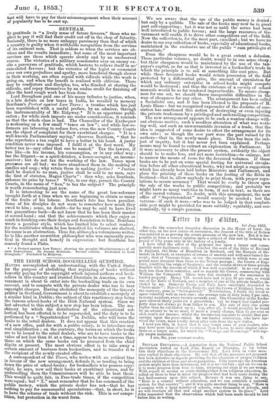BENTH.A.M.
Ir gratitude is "a lively sense of future favours," those who ne- glect to pay it will find their credit cut off in the shop of futurity. Seriously, there is no more unhappy parsimony than that of which a country is guilty when it withholds recognition from the services of its eminent men. That is seldom so when the services are ob- vious and the results immediate ; but some of the most important services are those which operate slowly and by an unobserved course. The victories of a military commander over an enemy ex- cite a paroxysm of gratitude, which hastens to relieve itself in ac- cumulated favours ; but the victories of the legist or economist over our own prejudices and apathy, more beneficial though slower in their working, are often repaid with ridicule while the work is going on, and when the benefit is realized with oblivion. There may be coadjutors and disciples, too, who flinched at sharing the ridicule, and repay themselves by an undue credit for finishing off alter the hard rough work has been done. Ir gratitude is "a lively sense of future favours," those who ne- glect to pay it will find their credit cut off in the shop of futurity. Seriously, there is no more unhappy parsimony than that of which a country is guilty when it withholds recognition from the services of its eminent men. That is seldom so when the services are ob- vious and the results immediate ; but some of the most important services are those which operate slowly and by an unobserved course. The victories of a military commander over an enemy ex- cite a paroxysm of gratitude, which hastens to relieve itself in ac- cumulated favours ; but the victories of the legist or economist over our own prejudices and apathy, more beneficial though slower in their working, are often repaid with ridicule while the work is going on, and when the benefit is realized with oblivion. There may be coadjutors and disciples, too, who flinched at sharing the ridicule, and repay themselves by an undue credit for finishing off alter the hard rough work has been done.
Lord Brougham paid one of his many tributes to justice, when, in a late debate on law taxes in India, he recalled to memory Bentham's Protest against Law Taxes ; a treatise which has just been republished with a useful preface, by an admirer, through the instrumentality of Mr. Ridgway.* It is an opportune publi- cation; for while such imposts are under consideration, it reminds us that the whole class is bad. The Chancellor of the Exchequer
• is reckoning on a few small "taxes on law"; and while law-re- formers are labouring to reduce fees, even the new County Courts
are the object of complaint for their exorbitant charges. It is a well-known Parliamentary saying," observes Bentham, "that he who reprobates a tax ought to have a better in his hand. A juster condition never was imposed. I fulfil it at the first word. My better tax is—any other that can be named." Tax the lawyer, if you like—in his income, his consumption, or in any other way ; tax the litigant—as a spirit-drinker, a house-occupier' an income- receiver ; but do not tax the working of the law. Taxes upon processes are all bad ; we have abandoned them in the making of candles and soap ; why retain them in making justice ? "justice shall be denied to no man, justice shall be sold to no man says the first of statutes Magna Charta" : then why, asks Bentham enhance its price by !taxes ? Why, in our day, permit the County Courts, in the name of "fees," to tax the subject ? The principle is worth remembering just now.
It is interesting to see the name of the great law-reformer brought forth at a time when we are beginning to obtain so many of the fruits of his labour. Bentham 's fate has been peculiar. Some of his disciples do not seem to remember how much they owed to him ; some, no doubt—for he may be said to have lived two generations back—do not know that he has been their master at second-hand ; and that the achievements which they enjoy so much in finishing owe their design and foundation to him. Bentham wrote a peculiar style, which has limited him to select readers ; for the multitudes whom he has benefited his volumes are shelved, his name is an abstraction. Thus far, although a voluminous writer, he is like another unwritten philosopher who was eminently prac- tical in thought and homely in expression : but Bentham has scarcely found a Plato.
• " A Protest against Law Taxes; showing the peculiar Mischievousness of all such Impositions. By Jeremy Bentham. Second edition. Dedicated to Lord Brougham." Published by Ridgway.


























 Previous page
Previous page